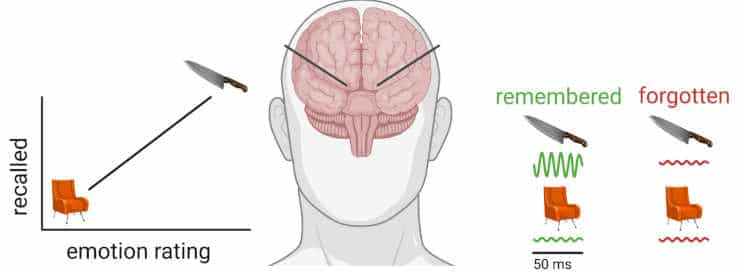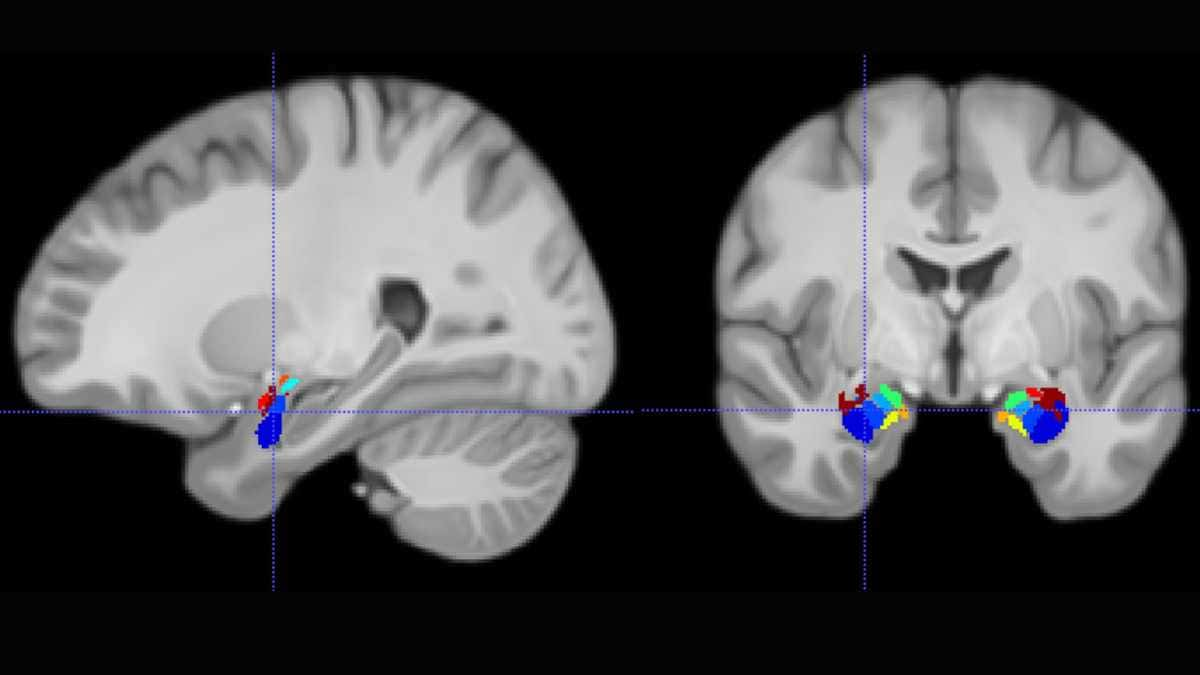Most people remember emotional events vividly, such as their wedding day, but researchers are unsure how the human brain prioritizes emotional events in memory. In a new study, Joshua Jacobs, an associate professor of biomedical engineering at Columbia Engineering, and his colleagues found that the human brain has a specific neural mechanism that tags information with emotional associations to help people remember it.
The researchers found that high-frequency brain waves in the amygdala, a hub for emotional processes, and the hippocampus, a hub for memory processes, are essential for improving memory for emotional stimuli. Disruptions to this neural mechanism, whether caused by electrical brain stimulation or depression, specifically impair memory for emotional stimuli.
“It’s easier to remember emotional events, like the birth of your child, than other events from around the same time. The brain clearly has a natural mechanism for strengthening certain memories, and we wanted to identify it,”
said lead author Salman E. Qasim, who began this project during his Ph.D. in Jacobs’ lab at Columbia Engineering.
Studying Emotional Memories
Memory disorders, such as dementia, are becoming more common, highlighting the negative effects that memory loss has on individuals and society. Depression, anxiety, and post-traumatic stress disorder (PTSD) can all have imbalanced memory processes, and they have become more common during the COVID-19 pandemic.
Understanding how the brain naturally decides what to store and what to let go of could help us come up with new ways to treat people who are at risk of memory loss or whose memory processes are out of whack.
Since these studies need direct access to the brain to record brain activity and conduct experiments that prove causality, like the careful disruption of neural circuits, they are typically conducted on animals like rats. But it is hard to see or describe a complex cognitive phenomenon like the improvement of emotional memory in animal studies.
Qasim and Jacobs examined data from memory tests done with epilepsy patients who were undergoing direct intracranial brain recording for seizure localization and treatment in order to study this process in humans. Patients with epilepsy memorized lists of words while electrodes were put in their hippocampus and amygdala to record the electrical activity of their brains.
Brain Wave Patterns

Qasim discovered that participants remembered more emotional words, such as “dog” or “knife,” better than more neutral words, such as “chair.” by systematically characterizing the emotional associations of each word using crowd-sourced emotion ratings.
When the researchers examined the associated brain activity, they discovered that whenever participants successfully remembered emotional words, high-frequency neural activity (30-128 Hz) increased in the amygdala-hippocampal circuit. This pattern was missing when participants remembered more neutral words or did not remember a word at all.
The researchers examined this pattern in 147 patients and discovered a clear link between participants’ enhanced memory for emotional words and the prevalence of high-frequency brain waves across the amygdala-hippocampal circuit in their brains.
“Finding this pattern of brain activity linking emotions and memory was very exciting to us, because prior research has shown how important high-frequency activity in the hippocampus is to non-emotional memory. It immediately cued us to think about the more general, causal implications; if we elicit high-frequency activity in this circuit, using therapeutic interventions, will we be able to strengthen memories at will?”
said Jacobs.
Emotional Word Memory Disrupted
To determine whether this high-frequency activity reflected a causal mechanism, Jacobs and his colleagues devised a novel method for replicating the types of experimental disruptions typically reserved for animal research.
First, they looked at a subset of these patients who had completed the memory task while receiving direct electrical stimulation to the hippocampus for half of the words. They discovered that electrical stimulation, which has a mixed history of benefiting or harming memory depending on its application, clearly and consistently impaired memory, particularly for emotional words.
Uma Mohan, a Ph.D. student in Jacobs’ lab at the time and co-author on the paper, observed that the stimulation reduced high-frequency activity in the hippocampus. This provided causal evidence that stimulation was selectively diminishing emotional memory by removing the pattern of brain activity associated with it.
Depression Disruption
Qasim went on to speculate that depression, which can involve dysregulated emotional memory, might behave similarly to brain stimulation. He examined patients’ emotional memories alongside mood assessments used to characterize their psychiatric state.
In fact, the team found that high-frequency activity in the hippocampus and amygdala decreased at the same time in a subset of patients with depression.
“By combining stimulation, recording, and psychometric assessment, they were able to demonstrate causality to a degree that you don’t always see in studies with human brain recordings. We know high-frequency activity is associated with neuronal firing, so these findings open new avenues of research in humans and animals about how certain stimuli engage neurons in memory circuits,”
said Bradley Lega, a neurosurgeon and scientist at the University of Texas Southwestern Medical Center, who was not an author on the paper.
Further Research
Qasim, a postdoctoral researcher at Mt. Sinai’s Icahn School of Medicine, is now pursuing this line of inquiry by investigating how individual neurons in the human brain fire during emotional memory processes.
Qasim and Jacobs hope that their work will inspire animal research into how this high-frequency activity is linked to norepinephrine, a neurotransmitter linked to attentional processes that they believe is responsible for the improved memory for emotional stimuli. Lastly, they hope that future studies will focus on high-frequency activity in the amygdala-hippocampal circuit to strengthen and protect memory, especially emotional memory.
“Our emotional memories are one of the most critical aspects of the human experience, informing everything from our decisions to our entire personality. Any steps we can take to mitigate their loss in memory disorders or prevent their hijacking in psychiatric disorders is hugely exciting,”
Qasim added.
Reference:
- Qasim, S.E., Mohan, U.R., Stein, J.M. et al. Neuronal activity in the human amygdala and hippocampus enhances emotional memory encoding. Nat Hum Behav (2023)
Last Updated on January 30, 2023
